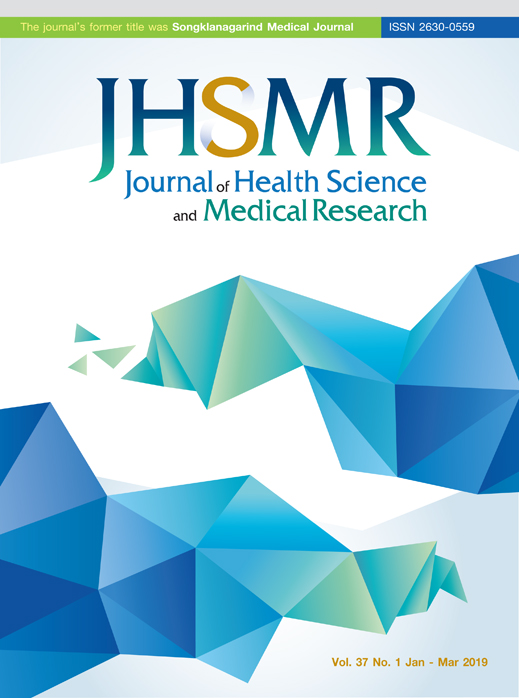Improvement of the Osmotic Fragility (OF) Test in α Thalassemia 1 Screening for HIV-1 Infected Patients by The New Cutoff Values of MCV and MCH
DOI:
https://doi.org/10.31584/jhsmr.201935Keywords:
α thalassemia, HIV-1, MCH, MCV, OF testAbstract
Objective: To evaluate the efficiencies of the standard α thalassemia screening regimen in human immunodeficiency virus (HIV) infected patients and improve the efficiencies of this screening regimen using new cutoff values.
Material and Methods: A screening process using the osmotic fragility (OF) test, the old cutoff values of mean corpuscular volume (MCV) and mean corpuscular hemoglobin (MCH) at <80 fL and <22 pg, and the new cutoff values at <87 fL and <29 pg was performed in 300 HIV infected patients. After which, a genetic study was performed to detect common α thalassemia 1 genes deletions composed of Southeast Asian and THAI deletions and also for hemoglobin constant spring and hemoglobin Pakse mutations for α thalassemia 2 carriers. Screening efficiency was estimated by sensitivity, specificity, positive predictive value (PPV) and negative predictive value (NPV).
Results: Sensitivity, specificity, PPV, and NPV of the original regimen for thalassemia screening in HIV infected patients were at 50.0%, 95.0%, 39.0% and 96.8%, respectively, demonstrating a high false positivity in HIV-1 infected populations. Therefore, new cutoff values for MCV and MCH were proposed at <87 fL and <29 pg, due to the highest value found in α thalassemia 1 carriers with HIV-1 infection. These new cutoff values showed higher sensitivity, specificity, PPV, and NPV at 100.0 92.6%, 46.2%, and 100.0%, respectively, and thus enhanced thalassemia screening efficiency in HIV-1 infected patients.
Conclusion: Incorporation of the OF test and the new cutoff values for MCV and MCH improve the efficiencies of α thalassemia 1 screening in HIV-1 infected patients. This helps reduce the cost of confirming positive test results in α thalassemia screening.
References
2. Yang Y, Li DZ. Early onset of fetal hydrops associated with the alpha-thalassemia - -(THAI) deletion. Hemoglobin 2014;38:431-4.
3. Li DZ, Liao C, Li J, Xie XM, Huang YN, Wu QC. Hemoglobin H hydrops fetalis syndrome resulting from the association of the - -SEA deletion and the alpha Quong Szealpha mutation in a Chinese woman. Eur J Haematol 2005;75:259-61.
4. Harteveld CL, Higgs DR. α-thalassaemia. Orphanet J Rare Dis 2010;5:1-21.
5. Tongsong T, Wanapirak C, Sirivatanapa P, Sanguansermsri T, Sirichotiyakul S, Piyamongkol W, et al. Prenatal control of severe thalassaemia: Chiang Mai strategy. Prenat Diagn 2000;20:229-34.
6. Maccioni L, Cao A. Osmotic fragility test in heterozygotes for alpha and beta thalassaemia. J Med Genet 1985;22:374-6.
7. Tangvarasittichai O, Poonanan N, Tangvarasittichai S. Using red cell indices and reticulocyte parameters for carrier screening of various thalassemia syndromes. Indian J Clin Biochem 2017;32:61-7.
8. Panyasai S, Saning R, Nooklieng L, Budiah H. Preliminary study of stability of blood used in the one tube osmotic fragility test to screen severe thalassemia carriers. Bull Chiang Mai Assoc Med Sci 2008;41:94-102.
9. United Nations programme on HIV/AIDS (UNAIDS). UNAIDS DATA 2017 [homepage on Internet]. Geneva: UNAIDS; 2017 [cited 2018 Apr 10]. Available from: https://www.unaids.org/sites/default/files/media_asset/20170720_Data_book_2017_en.pdf
10. Thisyakorn U. Elimination of mother-to-child transmission of HIV: lessons learned from success in Thailand. Paediatr Int Child Health 2017;37:99-108.
11. Patwardhan MS, Golwilkar AS, Abhyankar JR, Atre MC. Hematological profile of HIV positive patients. Indian J Pathol Microbiol 2002;45:147-50.
12. Okeke CO, Amilo GI, Ifeanyichukwu M, Ochiabuto OMTB, Onyemelukwe AO, Ibekailo SN. Effect of HIV infection and antiretroviral therapy duration on reticulocyte count and red cell indices. Int Blood Res Rev 2014;2:187-97.
13. Eyer-Silva WA, Arabe J, Pinto JF, Morais-De-Sa CA. Macrocytosis in patients on stavudine. Scand J Infect Dis 2001;33:239-40.
14. Athanassiou GA, Moutzouri AG, Gogos CA, Skoutelis AT. Red blood cell deformability in patients with human immunodeficiency virus infection. Eur J Clin Microbiol Infect Dis 2010;29:845-9.
15. Sae-ung N, Fucharoen G, Sanchaisuriya K, Fucharoen S. Alpha(0)-thalassemia and related disorders in northeast Thailand: a molecular and hematological characterization. Acta Haematol 2007;117:78-82.
16. Fucharoen S, Sanchaisuriya K, Fucharoen G, Panyasai S, Devenish R, Luy L. Interaction of hemoglobin E and several forms of alpha-thalassemia in Cambodian families. Haematologica 2003;88:1092-8.
17. Bordoni V, Viola D, Sacchi A, Pinnetti C, Casetti R, Cimini E, et al. IL-18 and stem cell factor affect hematopoietic progenitor cells in HIV-infected patients treated during primary HIV infection. Cytokine 2018;103:34-7.
18. Makipour S, Kanapuru B, Ershler WB. Unexplained anemia in the elderly. Semin Hematol 2008;45:250-4.
19. Zauli G, Re MC, Visani G, Furlini G, Mazza P, Vignoli M, et al. Evidence for a human immunodeficiency virus type 1-mediated suppression of uninfected hematopoietic (CD34+) cells in AIDS patients. J Infect Dis 1992;166:710-6.
20. Bordoni V, Bibas M, Viola D, Sacchi A, Cimini E, Tumino N, et al. Bone marrow CD34+ progenitor cells from HIV-infected patients show an impaired T cell differentiation potential related to proinflammatory cytokines. AIDS Res Hum
Retroviruses 2017;33:590-6.
21. Eisenstaedt R, Penninx BW, Woodman RC. Anemia in the elderly: current understanding and emerging concepts. Blood Rev 2006;20:213-26.
22. Quiros-Roldan E, Castelli F, Lanza P, Pezzoli C, Vezzoli M, Biasiotto G, et al. The impact of antiretroviral therapy on iron homeostasis and inflammation markers in HIV-infected patients with mild anemia. J Transl Med 2017;15:256.
23. Kim AH, Jang W, Kim Y, Park YJ, Han K, Oh EJ. Mean corpuscular volume (MCV) values reflect therapeutic effectiveness in zidovudine-receiving HIV patients. J Clin Lab Anal 2013;27:373-8.
24. Cooper RA. Influence of increased membrane cholesterol on membrane fluidity and cell function in human red blood cells. J Supramol Struct 1978;8:413-30.
25. Oliveira OC, Oliveira RA, Souza Ldo R. Impact of antiretroviral therapy on occurrences of macrocytosis in patients with HIV/AIDS in Maringa, State of Parana. Rev Soc Bras Med Trop 2011;44:35-9.
26. Moyle G, Sawyer W, Law M, Amin J, Hill A. Changes in hematologic parameters and efficacy of thymidine analoguebased, highly active antiretroviral therapy: a meta-analysis of six prospective, randomized, comparative studies. Clin Ther 2004;26:92-7.
























